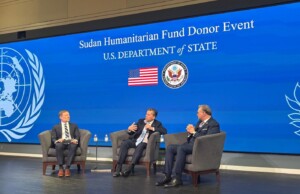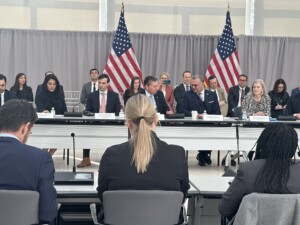Jurist: Sudan Junta-FFC political agreement is ‘crucial to move forward’
The debate over the political agreement to be signed with the military junta is still being debated by the Sudanese, while it is not yet clear when the negotiations on the constitutional declaration will begin in preparation for the final signing.
 Ahmed Rabee for the FFC, and TMC Deputy Chairman Lt Gen Mohamed Hamadan ‘Hemeti’ on behalf of the TMC at the signing ceremony at the Corinthia Hotel in Khartoum last week (Picture: SUNA)
Ahmed Rabee for the FFC, and TMC Deputy Chairman Lt Gen Mohamed Hamadan ‘Hemeti’ on behalf of the TMC at the signing ceremony at the Corinthia Hotel in Khartoum last week (Picture: SUNA)
The debate over the political agreement to be signed with the military junta is still being debated by the Sudanese, while it is not yet clear when the negotiations on the constitutional declaration will begin in preparation for the final signing.
Nabil Adib, a prominent Sudanese legal expert, human rights lawyer, and jurist, stresses the importance of the political agreement between the FFC and the TMC and calls on everyone to stick to it and look ahead.
Speaking to Radio Dabanga, he said that the political agreement bore too much and was subjected to criticism by parties who did not give themselves the opportunity to read it well.
He acknowledged that the political agreement is a partial agreement that does not refer to anything in detail and does not have a victorious or a defeated party.
On the necessity of the agreement, Nabil Adib said that the military junta kept returning every time to denounce and describe the points of agreement reached in previous meetings as mere points of understanding and not an agreement.
He added that for this reason it is important to sign such an agreement, such as the agreement on a parliamentary democratic system, which will resolve the controversy and differences that may arise in the constitutional document on the role of the Cabinet and the Legislative Council parliamentary, as the word has a specific meaning and that the Sovereign Council presides and does not govern.
On the contradictions that have been made about the political agreement signed, Nabil Adib said he had not heard what he was convinced so far of fundamental mistakes in the agreement.
He pointed out that some said that the agreement is blocking the way to legal reform in the future and the opposite will be found if the text of the agreement is reviewed, adding that some may not give themselves the opportunity to read what is written. He also noted that the agreement provided for the removal of the effects of the June 30 Salvation Regime because it worked to create parallel organs and used them illegally. He added, this is different from the idea of the deep state, which he said he does not believe in its presence in Sudan in the sense that it is found in a country like Turkey.
He called in his speech that the matters of reforms and the dismantling of Salvation Regime will be entrusted to the executive authority agreed upon should be given the opportunity and confidence to complete its mission.
Sudanese Congress Party
The Sudanese Congress Party described in a statement the political agreement signed with the TMC as a general framework for transitional power structures at their three levels, in which the principle of civilian superiority is achieved in the Sovereign Council and the Cabinet to be formed by the FFC and a temporary legislative body in which the FFC will hold the same tasks and the internal balance that came in the first agreement until the formation of the Legislative Council, which we adhere to the same proportions agreed upon previously.
The statement said that the agreement is expected to be completed through a constitutional document detailing the tasks and powers, including the Bill of Rights to complete the constitutional framework governing the transitional period.
The statement stressed that all the observations and shortcomings considered as the outcome of the broad popular discussions will be borne by the negotiating team of FFC in a unified way to discuss the constitutional document after the agreement with our comrades in the armed struggle movements in the meetings held these days in Addis Ababa.
The statement pointed out that prolonging the negotiations is harmful to the revolution and allows the opposing forces to turn their course and break up their unity.
The statement called for the next round to be final and short and that the FFC unite around a vision that does not compromise the demand of the transitional civilian authority.
Our editorial independence means that we can continue to provide factual updates about political developments to Sudanese and international actors, educate people about how to avoid outbreaks of infectious diseases, and provide a window to the world for those in all corners of Sudan. Support Radio Dabanga for as little as €2.50, the equivalent of a cup of coffee.












 and then
and then